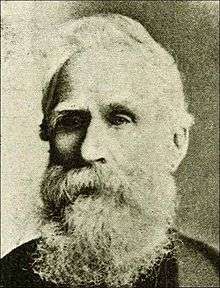Philip Francis Little
| Philip Francis Little | |
|---|---|
 | |
| 1st Premier of Newfoundland | |
|
In office 7 May 1855 – 15 July 1858 | |
| Monarch | Victoria |
| Lieutenant Governor |
Charles Henry Darling Alexander Bannerman |
| Preceded by | None |
| Succeeded by | John Kent |
| Supreme Court of Newfoundland Chief Justice | |
|
In office 29 November 1858 – 1868 | |
| Personal details | |
| Born |
1824 Charlottetown, Prince Edward Island |
| Died |
October 21, 1897 (aged 72–73) Monkstown, United Kingdom of Great Britain and Ireland |
| Political party | Liberal Party |
Philip Francis Little (1824 – October 21, 1897) was the first Premier of Newfoundland between 1855 and 1858. He was born in Charlottetown, Prince Edward Island. Little studied law there with Charles Young and was admitted to the bar in 1844.
He came to Newfoundland in 1846 and articled in law, the first Roman Catholic to practise law in St. John's. His strong views on responsible government, his connections in St. John's Catholic society, and his ability to unite disparate elements of the Liberal Party propelled him to a leadership role in politics.[1]
He helped lead the charge for responsible government along with John Kent. After it was granted in 1854, he went on to run a successful campaign as leader of the predominantly Roman Catholic Liberal Party. He became Newfoundland's first Premier in 1855 and served concurrently as the colony's Attorney-General. Little only remained in office until July 15, 1858,[2] when he resigned to be succeeded by John Kent.
He resigned in 1858 saying "I go now before the milk of Human kindness goes sour for me". He was right in that Newfoundland was about to enter an era of sectarian strife.
He was appointed as appointed assistant justice on the Supreme Court of Newfoundland in September 1858 and became Chief Justice two months later. In 1861, riots broke out over disputed election results from Harbour Grace. Little, as Chief Justice, played a prominent role in dispersing and calming the crowds.
Personal life
He married Mary Jane Holdright, from a wealthy Anglo-Irish family, in 1864. Patrick Little Sr. retired to Ireland in 1868 and worked for the Home Rule movement there. He and his wife had 13 children, the youngest of whom, Patrick, became a politician. Patrick Francis Little died at age 73 in 1897 in Monkstown, County Dublin.
References
- ↑ "The Government of Canada Commemorates Philip Francis Little as a Person of National Significance". Marketwire.com. Retrieved 31 January 2018.
- ↑ "Finding Aid No. 194" (PDF). Data2.archives.ca. Retrieved 31 January 2018.
Bibliography
- "Philip Francis Little". Dictionary of Canadian Biography (online ed.). University of Toronto Press. 1979–2016.
- Biography at The Canadian Encyclopedia